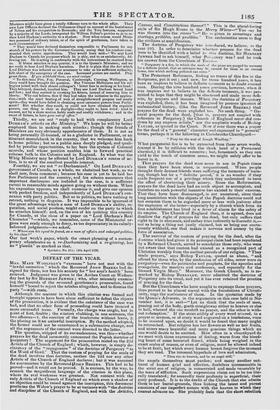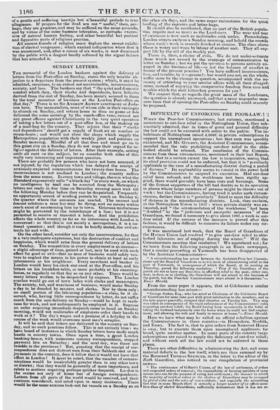DEFEAT OF THE VICAR.
1S4rts. AIARY WOOLFREY'S "excesses" have not met with the "lawful correction" which the Reverend JOHN BREEKS had de- signed for them, nor has his anxiety for "her soul's health" been relieved. Judgment was given in the Arches Court on Wednes- day last by Sir HERBERT JENNER ; who, after minutely examin- ing the grounds of the reverend gentleman's prosecution, found himself "bound to reject the articles altogether, and to dismiss the party "—with costs.
Although the manner in which this citation was framed and brought appears to have been alone sufficient to defeat the objects of the prosecution, it is evident that the substance of the case was bad, and that no other form of proceeding could have insured a more successful issue. Formally, the charge was single, but in point of fact, double ; the citation clubbing, in one sentence, the two offences-1. the erection of the tombstone without leave, 2. the placing on it an unlawful inscription. By the method adopted, the former could not be entertained as a substantive charge, and all the arguments of the counsel were directed to the latter.
The question, stripped of its encumbrances, was this—whether prayers for the dead necessarily announced the Popish doctrine of purgatory ? The argument for the prosecution rested on the 221 Article of the Church of England ; which, however, is simply de- claratory of the " repugnance " of the doctrine of Purgatory "to the Word of Gord." That the custom of praying for the souls of the dead involves that doctrine, neither the 22d nor any other Article of the Church of England declares ; but it was assumed for convenience by the Reverend IJoHst BREERS. This bad to be proved—and it could not be proved. It is curious, by the way, to remark the magnificent language of the citation in this place, where its real weakness was greatest. Not content with the only Article of the Church of England on which even a shadow of an objection could be raised against the inscription, this document proclaims the Widow's prayer to be at variance with "the doctrine and discipline of the Church of England, and with the Articles, Canons, and Constitutions thereof!" This is the plural-loving style of Sir Hugh Evans in the Merry Wives—"You sav he was thrown into the rivers He is given to stvearings • and startngs, pribbles, and prabbles." The ecclesiastics seem to flog the civilians at amplification.
The doctrine of Purgatory was iiitroduced, we believe, in the year 593. In order to determine whether prayers for the dead were to be identified with a belief in this doctrine, Sir HERBERT JENNER had to ask himself, what Porzatory was ? and he took his answer from the Catechism of Treni- " Purgatory is a fire, in which the souls of the pious are purged by torment for a definite period, that an entrance may be opened for them to an eternal home, into which nothing polluted can enter."
The Protestant Reformers, finding no traces of this fire in the Scriptures, put it out ; and now, for three hundred years, it has been as impious to believe in definite torments as to doubt eternal ones. During the nine hundred years previous, however, when it was impious not to believe in the definite torments, it was per- mitted to hope that they might be shot tened and made more defi- nite, by prayers and masses. When the doctrine of Purgatory was exploded, then, it has been imagined by persons ignorant of ecclesiastical history, (like the Reverend JOHN BREEKS,) that prayers for the dead were exploded too. No such thing. " Ge- neral prayers for the dead, [that is, prayers not coupled with reference to Purgatory.] the Church of England never did con- demn by any express article," are the emphatic words of Bishop TAYLOR, as quoted in the Court. Now if ever there was a prayer for the dead of a " general" character and expressed in " general" terms, perhaps it is the following in Carisbrooke Churchyard- " Pray for the soul of Joseph Woolfrey."
What purgatorial fire is to be extracted from these seven words, (except it be by collision with the thick head of a Protestant alarmist,) it is difficult to conceive ; but, forasmuch as they can yield to the touch of common sense, we might safely offer to be burnt in it.
That prayers for the dead were more in use in Popish times than they have been since, is unquestioned. When people thought their dearest friends were suffering the torments of burn- ing, though but for a " definite period," it is no wonder if they made frequent use of a privilege which they understood to have the effect of shortening their misery. Since the Reformation, prayers for the dead have had no such object to accomplish, and therefore no such powerful incentive has existed to their exercise. That they have been discouraged, is not unnatural, since their long association with the objects of the Popish doctrine could not but occasion them to be regarded more or less with jealousy after the explosion of the latter—especially by a church which from its first establishment has lived in a fever of alarm for the safety of its empire. The Church of England then, it is agreed, does not disallow the right of prayers for the dead, but only suffers that right to lie in abeyance, and rather tries indirectly to discredit it,— not as being a thing not justly claimed, but as being one conve- niently withheld, one that makes it nervous and uneasy by the force of association.
The survival of the custom of praying for the dead, after the doctrine which had given it its principal claim had been repudiated by a Reformed Church, served to scandalize those only, who were not aware that that custom had existed as a recognized part of Christian worship from the earliest periods of our religion. "They made prayers," says Bishop TAYLOR, quoted as above. "and offered for those who, by the confession of all sides, never were in purgatory—even for patriarchs and prophets, for the apostles and evangelists, for martyrs and confessors, and especially for the blessed Virgin Mary." Moreover, the Greek Church, as is re- marked by Bishop BERKELEY, never admitted the doctrine of Purgatory into its creed, and yet it has ever retained the practice of praying for the dead. But the Churchmen who have sought to expunge these prayers, thus proved to be almost coeval with the foundations of Christi- anity, urge the uselessness of them. In the quotation made by the Queen's Advocate, in the arguments on this case held in No- vember last, it is said—" Let us think that the souls of men, passing out of the body, goeth straightway either to heaven or else to hell, whereof the one needeth no prayer, and the other is with- out redemption." If the strict utility of every word uttered, in a prayer or sermon, or of every word engraved on a tombstone, were to be insisted upon, no doubt it would be found that many might be retrenched. But religion has her flowers as well as her fruits, and utters many beautiful and many gracious things which no one would desire to be omitted. How often in a churchyard do we meet with those expressions of feeling, warm from the bleed- ing heart of some bereaved friend, which being weighed an the exact scales of reason, or even of religion, must be allowed indeed to be at fault, but which every human breast forgives the moment they are read. The innocent hyperbole of love and admiration,
"Then rise to heaven, and be an angel still,"
the angels themselves must pardon; and many another out- burst of human grief and affection, doubtless unreasonable in the strict eye of religion, is consecrated and made venerable by the tears of affliction. Such expressions claim not to be too Lite- rally translated; for assuredly their profanity is superficial, thaw piety profound. It is to the credit of the Church that she admits them to her burial-grounds, thus linking the latest and purest emotions of our imperfect nature with the heaven to which they nearest advance us. She probably feels that the short rebellion of a gentle and suffering heartlis but ebeautiful prelude to true allegiance. If prayers for the dead are not" useful," then, per- haps, they are gracious, and may be suffered on the same grounds, and by virtue of the same humane toleration, as epitaphs expres- sive of natural human feeling, and other beautiful but poetical and figurative parts of religious practice.
All sincere friends of religion must deplore the recent exhibi- tion of clerical vengeance ; which excited indignation when first it was announced, and, after a career of six weeks, is now dismissed by the public with a disgust hardly softened by the signal failure that has attended it.



























 Previous page
Previous page